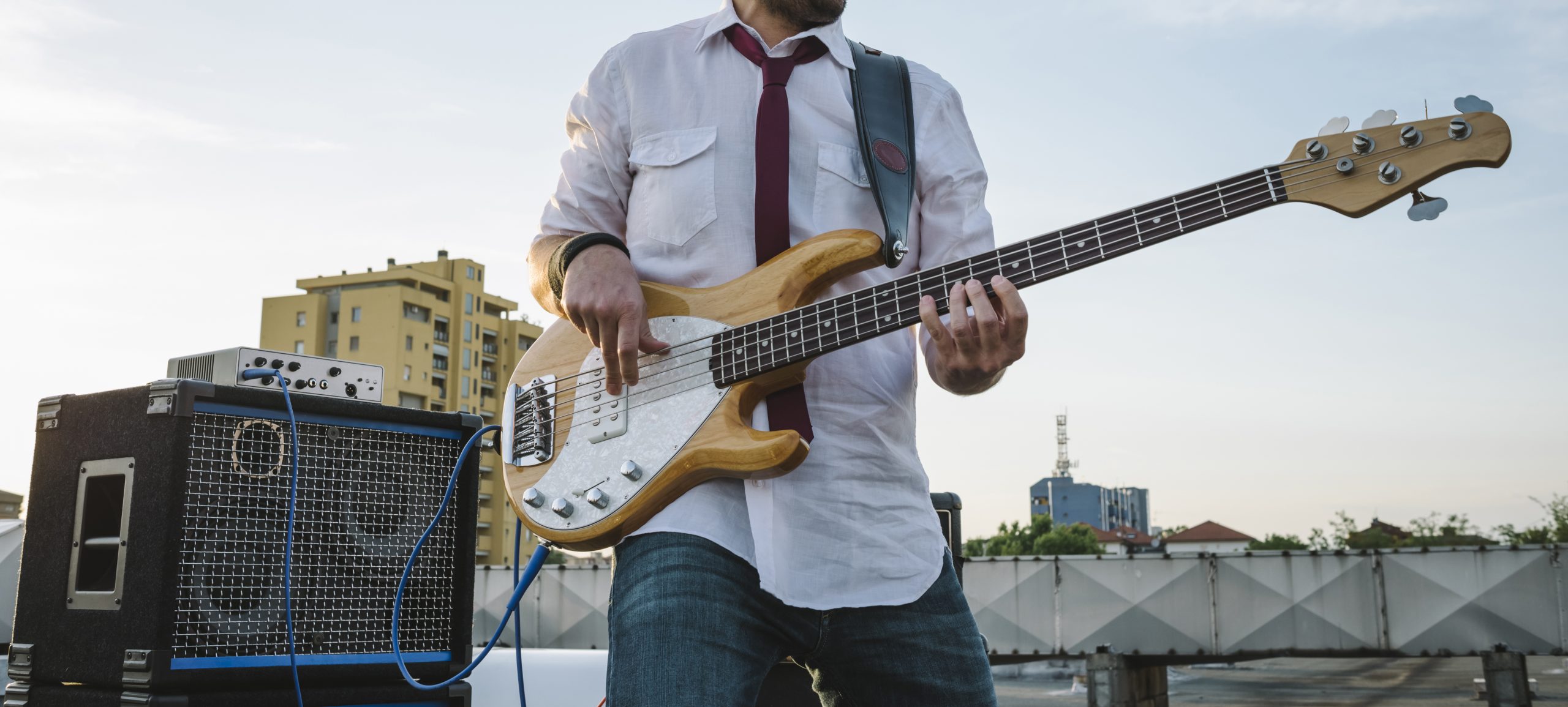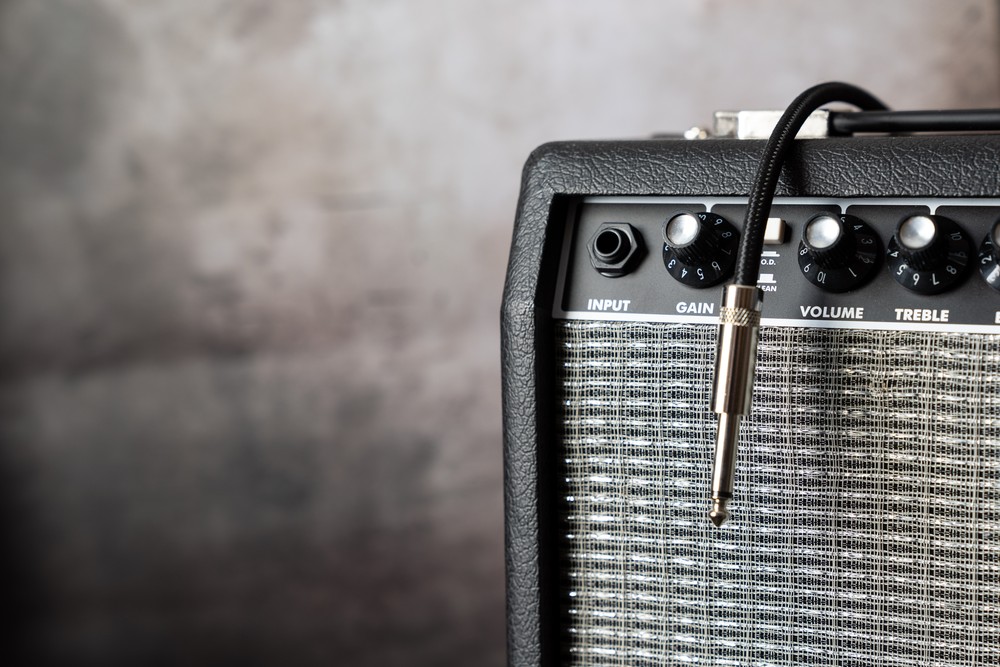The best bass practice amps offer a compact, portable design while still producing plenty of robust sound. In addition, they are very affordable and great options for beginners or those who want the flexibility of an extra practice setup at home.
Your best bass guitar will find a reliable companion in a practice amp because they are designed to produce deep, rich tones at lower volumes for any style of music. They’re perfect for practicing or performing for smaller audiences, providing decent sound, impressive bass output, and cool features.
Keep reading this buying guide to learn more about bass practice amps and how they work.
Top Bass Practice Amps
Read More
Snapshot
Read Less
Beginner’s Guide to Bass Practice Amps
What is a Bass Practice Amp?
A reliable bass practice amp is a small, portable amplifier designed for use with an electric bass guitar. This bass amplifier is typically lower in power than stage or combo amplifiers and is designed to be used in private practice, at home, or in small rehearsal spaces.
Portability is another factor that tends to define bass practice amps. They are typically small and lightweight so that they can be easily carried to and from rehearsals and gigs. As a result, they lack a heavier sound but are still great for beginners and experienced players because of their versatility.
Bass Practice Amps vs Traditional Amps
Bass practice amps are designed to be more user-friendly and easier to transport than a traditional best bass combo amp. A conventional combo bass amp is larger and heavier, making it challenging to move around. A performance bass amp will typically have more features and controls, which can be overwhelming for beginners.
Additionally, bass practice amps have fewer watts of power than traditional amplifiers. This is because they are designed for use in smaller spaces and don’t need to be loud. A practice amp also has a smaller speaker. While the size of the speaker will affect the sound, a 10-in speaker is average for this type of amp. Make sure the construction quality is decent enough though so it holds up after much use over time. Without durable construction and a lot of use and transporting, portable bass amps are going to wear down faster.
Because of a lack of advanced features, a bass practice amp is easier to set up and use than a traditional amplifier. They are also typically more affordable with fewer components, making them an excellent option for beginners. There are small headphone bass amps as well, where you attach the tiny device to your guitar and while you’re using headphones, you hear your bass playing via headphone output.
How Bass Practice Amps Work
Bass practice amps work by amplifying the sound of an electric bass guitar. In addition, the amplifier increases the instrument’s volume so you can hear it above other instruments in a band or rehearsal setting.
Most bass practice amps have a few basic controls, such as volume, treble, and bass. Some also have built-in effects, such as reverb or chorus.
This versatile bass amplifier typically has one or two speakers. The speaker is responsible for converting the amplified sound into audible vibrations, which are then sent to your ears.
The size of the connected speakers in a bass practice amp will determine how loud the amplifier can get. More prominent speakers can produce more audible sounds, while smaller speakers are better suited for lower volumes.
When using a bass practice amp, simply plug it into the wall, connect your bass guitar via an instrument cable, and turn it on. You can then adjust the volume and tone controls to get your desired sound.
Some bass practice amps also have a line-in input, which allows you to connect to other devices, such as a smartphone or MP3 player. This will enable you to play along with your favorite songs or backing tracks.
Why Should You Buy a Bass Practice Amp?
If you’re looking for something for practice or rehearsal, a bass practice amp is perfect because it allows for a more flexible playing arrangement, especially in a smaller setting. Many beginners like bass practice amps because they’re cheaper, but even a professional may want one for portability purposes or because it takes up less space.
Are Bass Practice Amps Worth Buying?
- They’re lightweight and portable: Bass practice amps are small and light, making them easy to transport versus performance amps for bass guitars that can be a bulky product. If you’re a gigging musician, this is a huge advantage, but they also accommodate a wide range of beginner needs.
- They’re user-friendly: Bass practice amps are designed to be easy to use, with straightforward amp controls and few features. This makes them ideal for beginners who are just starting and only need the basic features of an amp. Beginners may also want to check out the best online bass lessons to get the most out of their new practice amp.
- They’re affordable: You’ll find that bass practice amps are typically offered in a more affordable price range than traditional combo amplifiers, making them a fantastic bass amp for beginners and those who want decent tones, convenience, and portability. Pairing a budget bass amp with beginner bass guitars will help a beginner get their feet wet in practicing how to perform.
- They’re great for small spaces: Bass practice amps are designed for smaller areas, such as at home or in a rehearsal room. These are great solutions if you want bass amplification with volume control in a compact design. If you’re dealing with larger spaces, consider an alternative type of amp.
- They’re easy to set up and use: Most bass practice amps have only a few controls, making them easy to use. When you don’t have the time to set up complicated equipment, a practice amp is an excellent solution for a bass player to practice right away with a simple auxiliary input.
- They’re made for bass guitars: A bass practice amp does a better job of amplifying the low frequencies of a bass guitar than any other amplifier. Because of the differences in frequency between a bass guitar and a regular guitar, a bass practice amp is ideal and determines which bass cables vs. guitar cables to use.
Why a Bass Practice Amp Might Not be for You
- They don’t have as many features: Bass practice amps are designed for simplicity, so they don’t have as many essential features as traditional combo amplifiers. They lack a built-in tuner, mid knobs, control features, pre-gain control, input ports, overdrive, stereo jacks, or a headphone jack for silent practice. If you’re looking for a more versatile amplifier, a practice amp might not be the right choice. Quality solid-state amps are perfect for long-term use, but they’re not considered practice amps.
- They don’t offer as much control: A practice amp has a few front-faced controls, but it lacks a robust control panel with damping controls, a gain control feature, an onboard tuner, or advanced tone shaping. As a result, you won’t get the same classic bass tones as you will with a higher-quality amp.
- They’re not as loud: Amps for practice typically have fewer watts of power than traditional amplifiers. This means that they won’t be able to produce as loud of a sound, and they may produce fewer classic tones with an unwanted amount of distortion. If you need plenty of power, look for a performance-friendly amp with more powerful sound.
- They’re not suitable for large venues: Bass practice amps are designed for smaller spaces, so they’re not ideal for gigging in larger venues. For access during performances to better sound quality and more power output, larger speaker cabinets will offer a true bass sound.
How Long Will a Bass Practice Amp Last?
Bass practice amps are built to last a long time. With proper care and maintenance, your bass practice amp should last for up to 10 years.
To extend the life of your bass practice amp, be sure to keep it clean and dust-free, avoid exposing it to extreme temperatures, store it in a cool, dry place, use it only as directed, and follow the manufacturer’s instructions for use and care.
Before cleaning it, be sure to unplug it from the power source. Also, never allow liquids to come into contact with it.
Wipe down your bass practice amp with a soft, dry cloth after each use. If there is any build-up of dirt or grime, you can use a mild cleaning solution to remove it. Do not use harsh chemicals, cleaners, or solvents on your bass practice amp, as this could damage the finish or components.
Just as you might want the best stand for your bass guitar when you’re not using it, you’ll also want a place to store your bass practice amp to keep it in proper working order.
Do not expose your bass practice amp to direct sunlight or extreme temperatures, as this could damage the finish or components, in which case you’ll need to know how to fix a bass input jack and perform other repairs.
How to Choose a Bass Practice Amp
It’s important to evaluate a bass practice amp thoroughly to determine if it’s the right one for you. To choose a bass amp, first, think about your budget and what you’re willing to spend. Then, consider the size of the amp and how portable you need it to be. Additionally, pay attention to the amp’s wattage and number of channels. Finally, evaluate any extra features you may need or want.
Best Bass Practice Amp Key Factors
1. Does the cost matter?
Cost is always a factor when considering a purchase like a bass practice amp. Even though bass practice amps are less expensive than larger models, you still want to make sure you’re getting a quality product. So, evaluate your budget, what you’re willing to spend, and what features you can get for the price.
Spending more money doesn’t always mean you’re getting a better amp, so make sure you focus on quality and sound rather than price.
2. Should it be portable?
Bass practice amps come in various sizes, from small and lightweight to larger and more bulky models. If you plan to use your bass practice amp in different locations, you’ll want to choose an easy-to-transport model. Portable bass practice amps typically have fewer features than larger models, but they’re more convenient to move from place to place.
3. What wattage do I need?
The wattage of a bass practice amp will determine how loud it can get. If you need an amp that’s loud enough for gigging, you’ll want to choose a model with at least 50 watts of power, and 100 watts is even better, based on how you strum a bass guitar. However, if you’re only using the amp for practice at home, a lower wattage will suffice.
4. Should it have multiple channels or extra features?
Bass practice amps typically have one or two channels. If you plan on using your amp for both practice and performance, you’ll want an amp with two channels to switch between clean and distorted sounds. Some bass practice amps also have built-in effects like reverb or delay. These extra features can help but are not necessary for everyone.
Best Bass Practice Amps FAQs
Do you need a bass amp for gigging?
Surprisingly, you don’t need a bass amp for gigging, especially if you know you can simply hook up to the house system at the venue. Instead, a bass preamp or a DI unit may be sufficient for your needs. This is even smaller than a bass practice amp and more convenient for travel.
If you want to bring an amp for the warmth it adds, or if you need to use it as a monitor, then the ideal bass amp will have at least 50 watts and has two channels to switch between clean and distorted sounds.
Why do bass amps need more wattage?
Because of the way the human ear hears sounds, low frequencies require more wattage to be amplified than high frequencies. A 100-watt bass amp will sound quieter than a 100-watt guitar amp, but that’s because the low frequencies need more power to be heard.
Can you play bass with a guitar amp?
You can play bass with a guitar amp, but it’s not ideal. Guitar amps are designed to amplify high frequencies so that they won’t provide the same tonal quality as a bass amp. Additionally, guitar amps typically don’t have as much power, so they won’t be able to amplify the low frequencies as well.
Is a 10 to 15-watt amp good enough?
A 10 to 15-watt amp is excellent for a practice session at home, but it’s not powerful enough for gigging. If you need an amp for gigging, you’ll want one that’s at least 50 watts, and 100 watts is even better.
Sources:
spinditty.com
guitargearfinder.com










